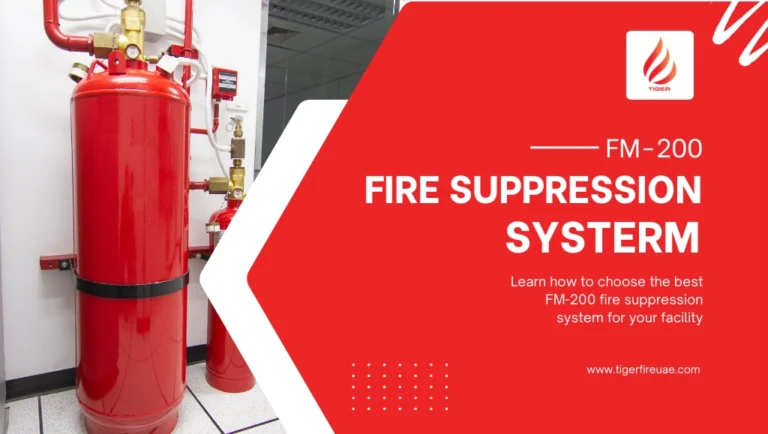Introduction
When it comes to protecting sensitive equipment, critical operations, and valuable property, the FM-200 fire suppression system is one of the most trusted solutions worldwide. Known for its fast response, clean extinguishing agent, and minimal downtime after discharge, FM-200 is widely used in data centers, control rooms, medical facilities, and other high-value spaces.
In 2025, fire safety requirements have become stricter, and choosing the right FM-200 system for your facility is more important than ever. This guide will walk you through how the FM-200 works, its benefits, the key factors to consider before installation, and how to ensure compliance with updated safety standards.
What is an FM-200 Fire Suppression System?
The FM-200 system is a clean agent fire suppression solution that uses heptafluoropropane (C3HF7) as the extinguishing agent. Unlike water-based sprinklers, FM-200 leaves no residue, is non-conductive, and is safe for electronics, documents, and sensitive equipment.
Key Features:
- Discharges within 10 seconds to suppress fires instantly.
- Leaves no water damage to assets.
- Environmentally responsible with zero ozone depletion potential.
- Safe for occupied spaces when installed correctly.
How Does FM-200 Work?
FM-200 works by absorbing heat and interrupting the chemical reaction in a fire. It does not remove oxygen from the air, making it safe for people.
Fire suppression process:
- Fire detection sensors trigger the system.
- FM-200 gas is released through a network of nozzles.
- The fire is suppressed within seconds.
- Minimal cleanup is needed, and operations can resume quickly.
Benefits of FM-200 Systems
Choosing FM-200 comes with a range of benefits for facilities that require maximum uptime and protection.
1. Speed
FM-200 acts within seconds, significantly reducing damage compared to water sprinklers.
2. Clean Operation
No residue means no costly cleanup or damage to electronics.
3. Safe for Occupied Spaces
Unlike CO₂ systems, FM-200 does not suffocate occupants.
4. Versatile Applications
Perfect for server rooms, telecom facilities, hospitals, museums, and control centers.
5. Environmentally Friendly
Meets ISO and NFPA 2001 standards with minimal environmental impact.
Where is FM-200 Used?
FM-200 is the preferred fire suppression system in locations where downtime is costly and protection is critical.
Common Applications:
- Data centers & server rooms
- Network operation centers (NOCs)
- Control rooms for oil & gas facilities
- Hospital operating rooms
- Archives and museums
- Banking and financial facilities
Factors to Consider Before Choosing an FM-200 System
Before investing in an FM-200 fire suppression system, you should evaluate several factors to ensure it’s the right fit for your facility.
1. Type of Facility
Consider whether your environment is highly sensitive to downtime or damage.
2. Room Size & Configuration
FM-200 systems are designed for enclosed spaces. The size and layout will determine gas quantity and nozzle placement.
3. Fire Risk Level
Facilities with high-value electronics or combustible materials benefit most from FM-200.
4. Compliance with Local Regulations
Ensure your system meets UAE Civil Defence, NFPA, and ISO fire safety standards.
5. Installation & Maintenance
Work with a certified FM-200 system installer for proper setup and annual inspections.
Steps to Choosing the Right FM-200 Fire Suppression System
Follow this process to make the right choice:
Step 1: Risk Assessment
Identify potential fire hazards in your facility.
Step 2: Consult with Fire Safety Experts
Get a site survey from a certified installer to determine the system design.
Step 3: Budget Planning
Consider the cost of installation, maintenance, and refilling after discharge.
Step 4: System Design
Plan nozzle placement, gas storage, and detection system integration.
Step 5: Regular Maintenance
Schedule annual inspections to ensure your FM-200 system remains fully operational.
FM-200 Maintenance Tips
- Annual inspection by certified technicians.
- Check gas cylinder pressure regularly.
- Test fire detection sensors.
- Update safety signage in protected areas.
Cost of an FM-200 Fire Suppression System
The cost depends on:
- Room size & number of nozzles
- Amount of gas required
- Control panel and detection system type
- Installation complexity
On average in the UAE, FM-200 systems cost between AED 30,000 and AED 150,000 depending on the project scope.
Conclusion
An FM-200 fire suppression system is one of the most effective, clean, and fast-acting fire protection solutions available today. Whether you’re protecting a data center, hospital, or control room, FM-200 ensures minimal downtime, compliance with safety standards, and peace of mind.
By carefully assessing your facility’s needs, working with a certified installer, and keeping up with regular maintenance, you can ensure your investment provides long-term fire safety in 2025 and beyond.

